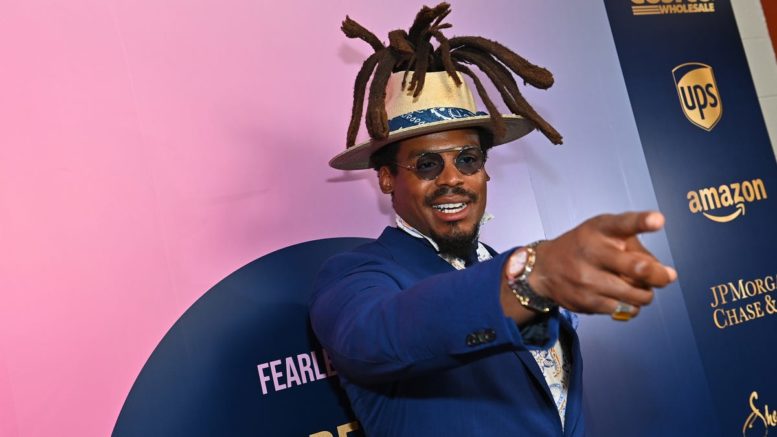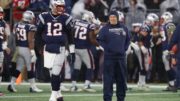Cam Newton has earned the right to stake his claim for the Content Clickbait King throne. He was a former MVP, Heisman Trophy winner, national champion and Super Bowl competitor. Newton recently caught a wave of backlash for classifying Brock Purdy, Dak Prescott, Jared Goff and Tua Tagovailoa as game managers. Technically, he didn’t insult them, but when you use that phrase, it’s implied. Returning fire at Newton is a waste of time. For him to throw shade at game managers isn’t surprising. Newton was built like a tree, used to sling cannonballs and often cashed it in with his legs. You took the good with the bad. Newton’s MVP season in 2015 was his magnum opus, even if he fell short of winning a Super Bowl At his peak, he was a high-risk, even higher-reward gunslinger until shoulder injuries limited him.
But let’s be clear here, if the quarterbacks he disparaged are game managers then maybe we should reconsider the negative connotation and re-evaluate how we talk about these superstar pocket executives. For decades, game manager has been a backhanded compliment for gun-shy, less-skilled quarterbacks who operate best behind the scenes, allowing their playmakers and defense to lead the way.
If we are evaluating players as game managers in comparison to Newton or Josh Allen, then we’re losing nuance.
Productivity-wise, you could make a case for Goff, but we need to redefine how we talk about game managers as a whole. Most of these game managers are actually superstar talent managers putting up blockbuster numbers.
This calls for a blind résumé test.
Quarterback A: 3,400 total yards, 23 touchdowns, seven interceptions, 3,300 yards, a 60% completion rate, 4.5 TD%, 1.4 INT%,
Quarterback B: 3,900 total yards, 30 total touchdowns, 13 interceptions, 61.7% completion rate, 7.1 TD%, 2.0 INT%,
Quarterback C: 3,700 total yards, 28 total touchdowns, 14 interceptions, 60.8 completion rate, 5.9 TD%, 3.0 INT%,
Quarterback D: 3,700 total yards, 30 touchdowns, 6 interceptions, 6.2 TD%, 1.3 INT%, 69.3 completion rate,
Quarterback E: 3,700 total yards, 27 touchdowns, 7 interceptions, 7.0 touchdown percentage, 1.9 INT%, 70.2 completion rate
Spoiler alert:
Quarterback A is Alex Smith, the Michael Scott of game managers in 2013, his first season as a Kansas City Chief. That year, he tossed 23 touchdowns, his career-high until his final season as a Chief when he had Tyreek Hill at his disposal and still couldn’t match up with Newton’s best non-MVP campaign in either yardage or scores. Meanwhile, Quarterback B is Cam Newton during his third season in the league. Newton was just beginning his ascent, but the difference in production is vast. Even if he surrendered twice as many turnovers as Smith. He was explosive and highly flammable like any dynamic quarterback.
Quarterback C is a young Tom Brady at the beginning of his prime during the 2005 season. He’s the Ari Emanuel of talent managers, but he started out as a lowly manager before evolving into a quarterback mogul, leaving the record book in tatters.
The latter two are Prescott and Purdy. Both of them are pushing P(assing yards and keepin’ it real) at the top of the NFC standings. It’s not even worth examining how illogical it is for anyone to refer to Prescott as a game manager, much less someone who should know better such as Newton. Prescott has always had the weight of the world on his shoulders as the Cowboys’ Lone Star quarterback. Dak’s Scooter Braun management style is on the rebound after losing much of the bandwagon following a rare turnover-happy 2022 season.
The perception of Purdy as a Darryl Philbin-caliber warehouse manager is understandable. The former Mr. Irrelevant is brand new on the national landscape after assuming the 49ers starting job barely a year ago, he’s kind of a square and he bears a strong resemblance to Mark Madsen. But anyone who’s watched him since college knows that Purdy is part Kris Jenner behind the scenes managing Christian McCaffrey, George Kittle, Deebo Samuel and Brandon Aiyuk, while occasionally giving fans whiplash with his daredevil tendencies.
This season though, he’s been a Marvel superhero and a possible MVP during a down year overall for quarterbacks. Game managers typically don’t earn the highest big-time throw rate (25+ yard completions) in three decades while throwing single-digit interceptions through 14 weeks, or leading the league in touchdowns per pass attempt. Have a problem with receivers juicing quarterback yardage totals after the catch? Game manager Patrick Mahomes led the entire league in yards after-catch average in both of his MVP seasons.
Take a guess at who leads the league in air yards, which measures how many yards a pass travels behind the line of scrimmage before being caught? It’s Tua Tagovailoa, the Rich Paul of game talent managers. Purdy and Prescott join him as the league leaders, comprising three of the four league leaders. Tagovailoa should be as grateful for Tyreek Hill as Paul is for crossing paths with LeBron James, but he’s carving out a path as one of the most accurate deep-ball passers in the league. Most importantly, he’s a stable and trustworthy steward of the Dolphins’ attack. He could stand to be a little more clutch, but he’s the engine behind Mike McDaniel’s scheme.
If being a game manager is wrong, I don’t want to be right. Almost every quarterback in the league would trade places with these game managers. Hell, Cam Newton still wishes he could be them. All in all, game manager shouldn’t be an insult. It’s a badge of honor.
Follow DJ Dunson on X: @cerebralsportex
Original source here
#Cam #Newton #doesnx27t #understand #x27game #managerx27 #means





